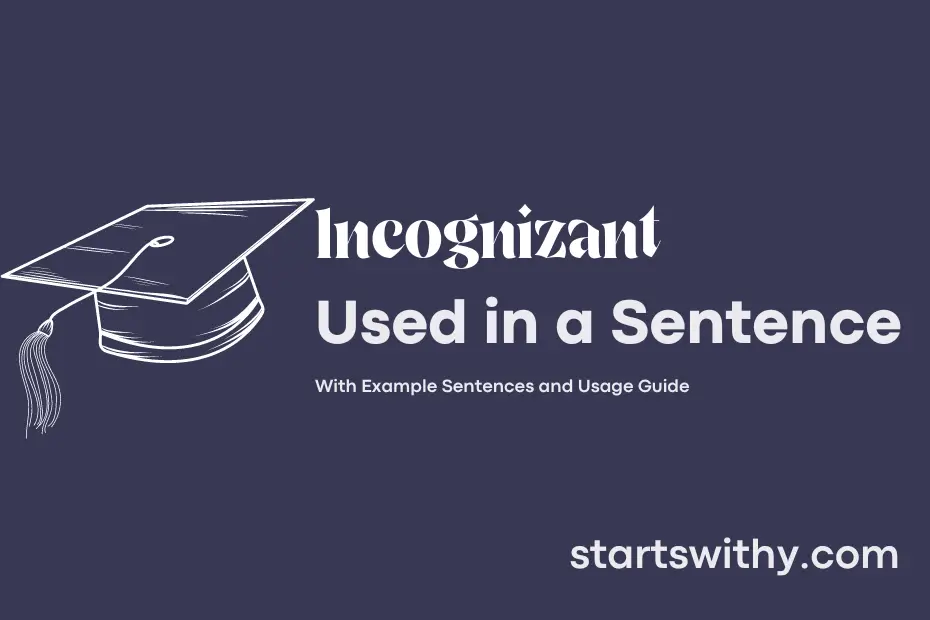Have you ever used a word without realizing its true meaning? Words like “incognizant” can easily trip up even experienced language users. “Incognizant” refers to being unaware or lacking knowledge about something.
The term “incognizant” is often used to describe a state of being uninformed or oblivious. It can be a fancy way of saying someone is unaware or ignorant of a fact or situation.
7 Examples Of Incognizant Used In a Sentence For Kids
- **Some animals are incognizant of their surroundings.
- **The little bird was incognizant of the cat approaching.
- **She was incognizant of the surprise party planned for her.
- **The child seemed incognizant of the instructions given.
- **The puppy appeared incognizant of the mess it made.
- **The sleepy kitten was incognizant of the loud noise outside.
- **The butterfly was incognizant of the storm coming.
14 Sentences with Incognizant Examples
- Despite attending lectures regularly, many students remain incognizant of the upcoming exam schedule.
- Some students are incognizant of the college library’s extensive resources for research and study.
- Due to their busy schedules, students are often incognizant of the clubs and societies available on campus.
- Many students are incognizant of the importance of time management in college life.
- Being incognizant of the plagiarism policies can lead to unintentional academic misconduct.
- Students who skip classes are often incognizant of the valuable information they are missing out on.
- Some students are incognizant of the mental health resources provided by the college counseling center.
- Failing to pay attention in class can leave students incognizant of key concepts necessary for exams.
- Students who procrastinate are often incognizant of the negative impact it can have on their grades.
- Being incognizant of the campus safety protocols can put students at risk in emergency situations.
- Students who are incognizant of their career options may struggle to make informed decisions about their future.
- Missing important emails from professors can leave students incognizant of important announcements and deadlines.
- Some students are incognizant of the academic support services available to help them succeed in their courses.
- Being incognizant of the academic integrity policies can lead to unintentional violations and consequences.
How To Use Incognizant in Sentences?
To use the word “Incognizant” in a sentence, follow these steps:
-
Understand the Meaning: Incognizant means to be unaware or lacking awareness of something. Make sure you know the definition before using it in a sentence.
-
Choose a Context: Think about a situation where someone is not aware of something, and you want to express that using the word Incognizant.
-
Construct the Sentence: Start your sentence with a subject, followed by a verb and then use Incognizant to describe the lack of awareness. For example: “She was incognizant of the fact that he had already left.”
-
Check Grammar: Ensure that the sentence is grammatically correct. Use proper punctuation and capitalization.
-
Practice: Try using the word Incognizant in different sentences to get comfortable with its usage. This will also help you understand how it can fit into various contexts.
-
Get Feedback: If possible, ask someone to review your sentence to see if it effectively conveys the meaning of being unaware.
Remember, the key to mastering the use of the word Incognizant is to practice regularly and incorporate it into your vocabulary. With time and effort, you will become more confident in using this word accurately in sentences.
Conclusion
In conclusion, the examples of sentences containing the keyword “incognizant” demonstrate its use in highlighting someone’s lack of awareness or knowledge about a particular situation or fact. These sentences illustrate how individuals can be caught off guard or surprised due to being incognizant of certain details or developments. By incorporating this term into sentences, it becomes apparent how crucial it is to stay informed and attentive to avoid being incognizant in various scenarios.
Overall, the use of the word “incognizant” adds depth to sentences by emphasizing the importance of being mindful and cognizant of one’s surroundings. It serves as a reminder to stay alert and informed to avoid being caught incognizant in critical moments, thereby underlining the significance of awareness and knowledge in navigating through different situations effectively.



